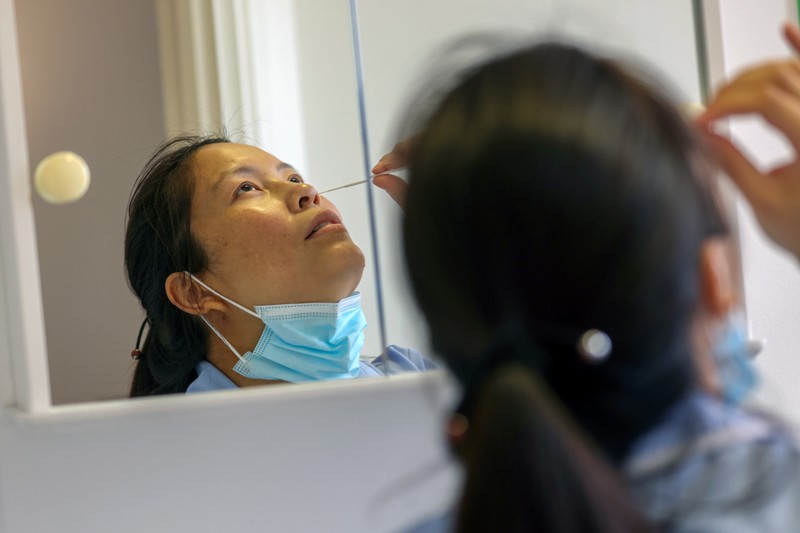Most people who catch and recover from COVID-19 are likely to be immune for several months afterwards, a study of more than 20,000 health-care workers in the United Kingdom has found.
The study — published on the preprint server medRxiv on 14 January — concluded that immune responses from past infection reduce the risk of catching the virus again by 83% for at least five months.
Over the course of the past year, reports of repeat infections with the SARS-CoV-2 coronavirus have shaken confidence in the immune system’s ability to sustain its defences against the virus. The interim results from the study, called SIREN, assuage some of those fears, said Susan Hopkins, senior medical adviser at Public Health England and the study’s lead investigator, in a press briefing. The data suggest that natural immunity might be as effective as vaccination, she added, at least over the five-month period the study has covered so far.
The data suggest that repeat infections are rare — they occurred in fewer than 1% of about 6,600 participants who had already been ill with COVID-19. But the researchers also found that people who become re-infected can carry high levels of the virus in their nose and throat, even when they do not show symptoms. Such viral loads have been associated with a high risk of transmitting the virus to others, said Hopkins.
“Reinfection is pretty unusual so that’s good news,” says immunologist John Wherry of the University of Philadelphia in Pennsylvania. “But you’re not free to run around without a mask.”
Regular screening
SIREN is the largest study of coronavirus reinfection that systematically screened for asymptomatic infections, said Hopkins. Participants underwent blood tests for SARS-CoV-2 antibodies and PCR tests for the virus itself every two to four weeks.
Over thefive months, the team found 44 possible reinfections. In the group of 14,000 participants that had not been previously infected, 318 people tested positive for the virus.
Some of the reinfection cases are still being evaluated, Hopkins said. All 44 cases are considered “possible” reinfections, and were classified based on PCR tests combined with screening measures taken to reduce the risk of re-detecting virus from the initial infection. So far, only two of these 44 cases have passed more stringent tests. The study did not assess whether symptoms were better or worse during the second infection compared to the first, but Hopkins notes that only 30% of the people with possible reinfections reported any symptoms, compared with 78% of participants with first-time infections.
At the moment, the team does not have enough data to tease out who might be more at risk for reinfection than others. And immunologist George Kassiotis of the Crick Institute in London notes that participants in the study were mainly women, and fairly young. “This group is unlikely to experience the most severe form of COVID-19,” he says, “and may not be representative of the population as a whole.”
The study is ongoing, and investigators plan to collect data over a longer time period, to get a sense of how long immunity lasts and to investigate the effects of a SARS-CoV-2 variant called B.1.1.7 that emerged in 2020 and has rapidly spread across the country. Although there are many reasons to suspect that existing protection should cover the new variants, it is possibile that immune responses raised against one variant will be less effective against another, says Kassiotis. “It is still an open question.”
"still" - Google News
January 14, 2021 at 07:19AM
https://ift.tt/2XDRcnW
COVID reinfections are unusual — but could still help the virus to spread - Nature.com
"still" - Google News
https://ift.tt/35pEmfO
https://ift.tt/2YsogAP
Bagikan Berita Ini
















0 Response to "COVID reinfections are unusual — but could still help the virus to spread - Nature.com"
Post a Comment